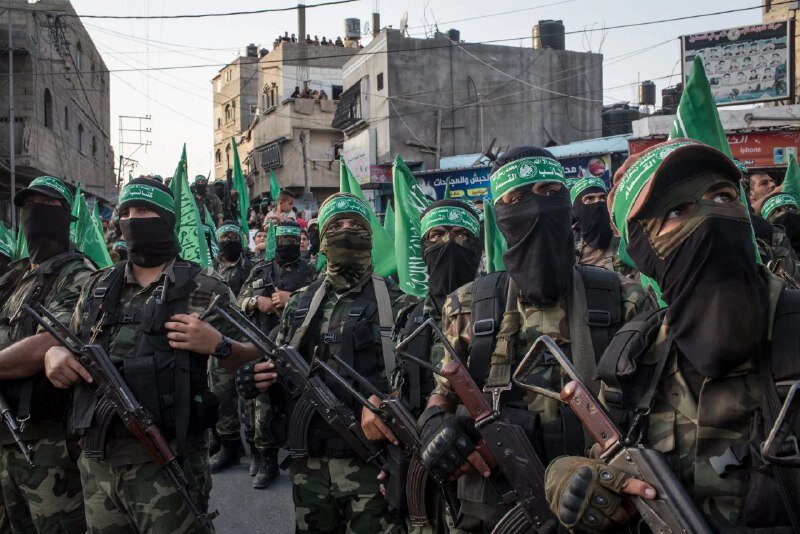Hamas on the offensive
Palestinian resistance changes tactics

TEHRAN - As the Israeli occupation forces (IOF) commit further massacres against civilians in the Gaza Strip, the Palestinian resistance has changed its strategy from defensive to offensive.
There are several factors behind this strategic tactic.
Israeli Prime Minister Benjamin Netanyahu and his cabinet rejected the ceasefire deal proposed to Hamas and Tel Aviv by the Egyptians, Qataris, and the United States.
It showed that Netanyahu is not interested in peace, prompting the resistance to go on the offensive against the IOF in an effort to force a ceasefire.
The Israeli rejection of a sustainable ceasefire has also proven, once again, to the Palestinians that the humanitarian crisis in Gaza lies solely with Netanyahu’s government and its indiscriminate orders to the IOF.
The second factor is that the Gaza resistance was not the side seeking an all-out regional war. But Netanyahu’s cabinet was. However, Iran’s Operation True Promise (carried out after the Israeli military bombed Tehran’s consulate building in Damascus) and the position of the United States, which essentially informed its Israeli ally that America would not partake in attacking Iran the possibility of an all-out regional war was greatly reduced.
The Israelis did not respond to Operation True Promise. This allowed the Palestinian resistance to change the rules of the game.
More importantly, Israeli ignorance of measures taken by international institutions, including the UN General Assembly and orders by top UN courts - the International Court of Justice and the International Criminal Court - highlighted how much Netanyahu is violating international law and in particular international humanitarian law.
Finally, public surveys show the rising number of Israelis who are opposed to the genocidal Israeli war and the high number of Palestinians who are refusing to leave Gaza despite the barbaric nature of the Israeli bombardment. Gazans have sent a clear message: there won’t be another Nakba. They would rather die than be displaced again as has been advocated by Netanyahu’s cabinet.
The changes in the Gaza resistance are evident in the missile barrage it launched toward Tel Aviv on Sunday for the first time in months. Another example of the offensive nature of the Palestinian resistance was the operation it staged in the Jabalia refugee camp.
"Our fighters lured a Zionist force into an ambush inside a tunnel ... The fighters withdrew after they left all members of the force dead, wounded, and captured," Abu Ubaida, the spokesman for the armed wing of Hamas, the al-Qassam Brigades, said in a message broadcast by Al Jazeera early on Sunday.
This is the first time that Hamas has taken Israeli soldiers captive since October 7.
The location of the operation is also significant. The IOF said it had “cleansed” Jabalia from Hamas fighters months ago. The operation shows Hamas not only has maintained its presence in northern Gaza it is also capable of launching one of the most sophisticated operations.
According to experts, the resistance in Gaza, which recently announced its readiness for a “war of attrition”, has the will and enough ammunition to target the IOF soldiers for several years.
In parallel with the developments on the battlefield, the Israeli occupation attempted to promote the idea of imminent negotiations, a claim denied by Hamas, which asserted that the occupation "is maneuvering to cover up its criminal actions" and "is not serious about reaching a deal."
According to experts familiar with the Palestinian resistance, the Hamas leadership decided not to return to negotiations before a ceasefire and the withdrawal of occupation forces from the Gaza Strip.
Experts say this decision comes as a result of the deception and evasion tactics of Netanyahu and the administration of U.S. President Joe Biden.
Analysts believe the Gaza resistance is dealing with a new reality on all fronts and that the resistance has the upper hand on its key demands in any future negotiations.
According to reports, Hamas has sent a message to mediators that a permanent ceasefire must be declared, and any new proposal that does not take this into account will not be accepted.
In essence, Netanyahu’s cabinet is trying to cover up its failures in Rafah and Jabalia by deciding to return to negotiations.
It would not be surprising to see more achievements by resistance forces in the coming days and weeks as long as the Israeli army is occupying Gaza.
The equation has changed. The Israeli regime is very likely to end up paying the price of absolute failure for not accepting the ceasefire proposal that was accepted by Hamas.
An official with the Palestinian resistance who spoke to regional media said “Hamas has not backed down from the paper presented regarding the cessation of aggression as Netanyahu did not want to stop the war," clarifying that "the resistance has the right to change the rules of the game in negotiations as it did in the (battle) field".
Leave a Comment